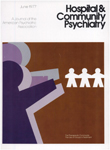Mini-Groups: Maximizing the Therapeutic Milieu on an Acute Psychiatric Unit
Abstract
The authors have found small groups (called mini-groups) an effective way to work with patients who are too regressed or disturbed to benefit from individual psychotherapy and who find larger groups over-whelming and confusing. Mini-groups were formed in 1974 on a 20-bed acute inpatient service of a private psychiatric hospital, where traditional treatment approaches have been altered because of a more disturbed patient population and a shorter length of stay. A high staff-to-patient ratio, sometimes almost one to one, lends stability to the groups.
Access content
To read the fulltext, please use one of the options below to sign in or purchase access.- Personal login
- Institutional Login
- Sign in via OpenAthens
- Register for access
-
Please login/register if you wish to pair your device and check access availability.
Not a subscriber?
PsychiatryOnline subscription options offer access to the DSM-5 library, books, journals, CME, and patient resources. This all-in-one virtual library provides psychiatrists and mental health professionals with key resources for diagnosis, treatment, research, and professional development.
Need more help? PsychiatryOnline Customer Service may be reached by emailing [email protected] or by calling 800-368-5777 (in the U.S.) or 703-907-7322 (outside the U.S.).



